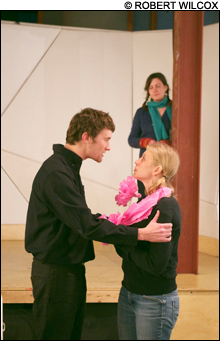
WITH BOTH HANDS The Viewpoints approach informs Lorca’s Blood Wedding. |
Just about a year ago, an irrepressible new grassroots theater ensemble in Portland surged to the stage with the gloriously unabashed boorishness of Ubu Roi, a gem of French proto-Absurdism.With Tess Van Horn at the directorial helm, the cast regaled audiences with puppets, obesity prosthetics, and a wealth of hilariously simulated scatological acts. This weekend, much of that ensemble returns to SPACE Gallery, with an array of fine new members and a production that represents quite a swerve in ethos: After the ridiculous guffaws of Ubu Roi, they turn now to the lyrical anguish of Blood Wedding, Spanish poet Federico García Lorca's masterful 1932 tragedy. Van Horn again directs, in a production that was gorgeously haunting even in the un-costumed rehearsals I sat in on over the last month. For the time being, you have only this one weekend to catch it, which I strongly recommend doing.
The sweltering, classically elegant Blood Wedding presents us with a history and heritage of violence, against which plays out a love triangle: The Groom (Michael Dix Thomas), whose father was been killed by a man from the neighboring Felix family, and whose bitter Mother (Patricia Mew) can barely take a breath without grieving anew, is to be wed to the Bride (Amanda Huotari). But the Bride's former lover Leonardo (the Phoenix's Nicholas Schroeder), who is married to the Bride's cousin (Amanda Painter) and who is of the Felix clan himself, has been riding his horse through the wee hours to watch at the Bride's window. The horror that all this will bring is foreshadowed from the beginning, in women's talk over kitchen knives and in lullaby lyrics of carnations, the flower of death.
Because many of us Yankees might have a hard time relating to the murderous Spanish passions and fiery ways of Blood Wedding, one element of Van Horn's approach to the drama is to move its setting from Spain to our own state. Mainers' comparably restrained culture makes an intriguingly different vessel for all that is said and unsaid in Lorca's tale of small-town secrets, and ensemble member Claire Guyer has researched the daily community texture of earlier Portland neighborhoods to enrich the show. The New England setting is further evoked by the show's musical ensemble, the band Hersey State, who make banjo-rich, shanty-esque tunes of the script's several songs. (The furniture, locally made by Jonas Eule and painted by Patrick Corrigan, is another contributing element.)
Also notable in this production is Van Horn's incorporation of collaborative Viewpoints methods into the rehearsal process. Developed in the '70s, Viewpoints asks actors to explore their roles through extensive exercises in movement, gesture, and voice. As Van Horn describes the philosophy, "It's a way of breaking out of conventional modes of acting, which can be very intellectual." Instead of thinking their way into the text they must deliver, actors are encouraged to explore more visceral modes, to feel how flesh, muscles, and momentum inform their characters' words and acts.
In one exercise, Van Horn explained, she ran a fraught scene between Leonardo and the Bride several times, asking them to play with the ideas of resistance and shape: In one run, they weren't ever to look at each other; in the next, Huotari was to constantly resist Leonardo physically; in another, they were to be touching each other in some way through the entire scene.